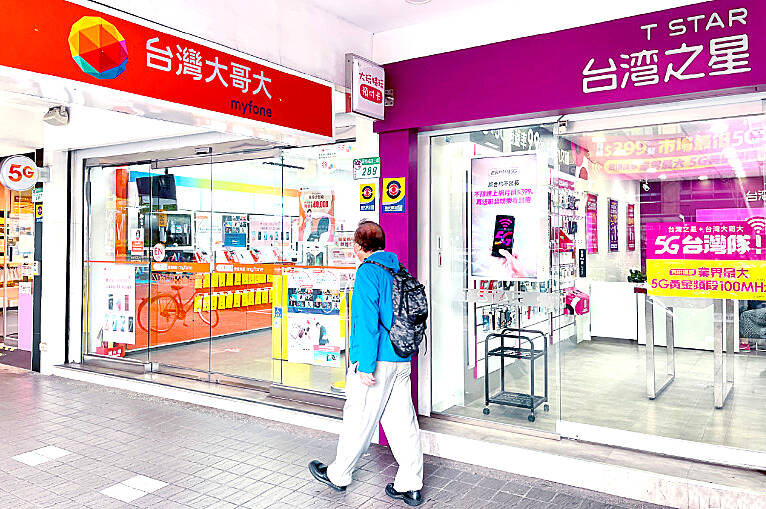Taiwan Mobile Co (台灣大哥大) yesterday said it aims to complete its acquisition of Taiwan Star Telecom Corp (台灣之星) by the end of this year, after the Fair Trade Commission gave a conditional go-ahead to the deal.
The transaction would boost the subscriber base of the new entity to nearly 10 million users along with elevated bandwidth and frequency, Taiwan Mobile said in a statement.
Taiwan Mobile’s board of directors in August approved a proposal to raise its capital spending this year to NT$15.65 billion (US$487.16 million) to fund the integration of base stations managed by the two firms.

Photo: George Tsorng, Taipei Times
Taiwan Mobile currently operates 13,000 base stations, while Taiwan Star owns 9,000 units, the companies’ data showed.
“With the regulatory approval, Taiwan’s telecom industry is ushering in a new era,” Taiwan Mobile said. “The new Taiwan Mobile will offer services with greatly elevated bandwidth and frequency for subscribers.”
In July, Far EasTone Telecommunications Co (遠傳電信) obtained an approval from the commission to absorb smaller peer Asia Pacific Telecom Co (亞太電信) in a deal valued at about NT$24.7 billion.
The number of telecom operators in Taiwan would be reduced to three from five following the latest industry consolidation.
“The telecom industry is both technology and capital-intensive. Telecom operators will be able to enhance their operational efficiency and competitiveness through mergers,” the commission said in a statement yesterday.
To maintain market competition and ease concern about market concentration, the commission demanded that Taiwan Mobile safeguard the interests of subscribers and ensure the service quality.
Taiwan Mobile must comprehensively accept terms of Taiwan Star’s existing contracts and ensure Taiwan Star’s subscribers to continue services until Dec. 31, 2025, the commission said.
In addition, Taiwan Star’s 4G subscribers are to continue their contracts until the expiration of the company’s 4G bandwidth license, it said.
Meanwhile, service subscribers who are mentally or physically challenged, from low-income households or 65 years or older can subscribe to preferential tariff plans for at least five years, the commission said. General subscribers can access preferential tariff plans for at least one year, it said.

In Italy’s storied gold-making hubs, jewelers are reworking their designs to trim gold content as they race to blunt the effect of record prices and appeal to shoppers watching their budgets. Gold prices hit a record high on Thursday, surging near US$5,600 an ounce, more than double a year ago as geopolitical concerns and jitters over trade pushed investors toward the safe-haven asset. The rally is putting undue pressure on small artisans as they face mounting demands from customers, including international brands, to produce cheaper items, from signature pieces to wedding rings, according to interviews with four independent jewelers in Italy’s main

Macronix International Co (旺宏), the world’s biggest NOR flash memory supplier, yesterday said it would spend NT$22 billion (US$699.1 million) on capacity expansion this year to increase its production of mid-to-low-density memory chips as the world’s major memorychip suppliers are phasing out the market. The company said its planned capital expenditures are about 11 times higher than the NT$1.8 billion it spent on new facilities and equipment last year. A majority of this year’s outlay would be allocated to step up capacity of multi-level cell (MLC) NAND flash memory chips, which are used in embedded multimedia cards (eMMC), a managed

In the wake of strong global demand for AI applications, Taiwan’s export-oriented economy accelerated with the composite index of economic indicators flashing the first “red” light in December for one year, indicating the economy is in booming mode, the National Development Council (NDC) said yesterday. Moreover, the index of leading indicators, which gauges the potential state of the economy over the next six months, also moved higher in December amid growing optimism over the outlook, the NDC said. In December, the index of economic indicators rose one point from a month earlier to 38, at the lower end of the “red” light.

The global server market is expected to grow 12.8 percent annually this year, with artificial intelligence (AI) servers projected to account for 16.5 percent, driven by continued investment in AI infrastructure by major cloud service providers (CSPs), market researcher TrendForce Corp (集邦科技) said yesterday. Global AI server shipments this year are expected to increase 28 percent year-on-year to more than 2.7 million units, driven by sustained demand from CSPs and government sovereign cloud projects, TrendForce analyst Frank Kung (龔明德) told the Taipei Times. Demand for GPU-based AI servers, including Nvidia Corp’s GB and Vera Rubin rack systems, is expected to remain high,